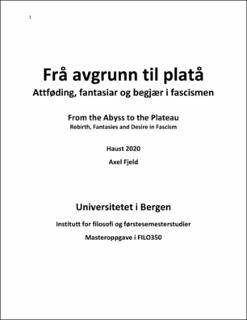| dc.description.abstract | Fascism lingers on, despite our best efforts. The thesis at hand asks why, and how it may be dealt with. More precisely, it questions which subterranean impulses, fixations and fantasies characterise fascism as a human phenomenon, to answer the pressing question of why some people become fascists. Starting from what might be called the mainstream academic consensus on the matter, it goes on to engage with recent historical and philosophical work to examine not simply fascism as a historical event, but the “fascism in our hearts”. Providing insight into contemporary fascist movements and their rhetorical strategies, it also displays the link between certain rhetorical messages and underlying reactionary impulses. It finds that fascism is characterised by certain themes of fantasy, which all lead to a position of misogynist masculinity. Fascism is also characterised by a struggle for control and is driven by a irreducible desire to dominate which is renewed by the material and psychological struggles of life in hierarchical societies. This results in a fixation on a phantasm of ascension from the chaotic, murky and frightening abyss, up to the safety of the clean, orderly and illuminated plateau – a fixation which fuels the daily engagement and activism of the fascist individual. With Klaus Theweleit’s Male Fantasies as main inspiration, chapter one begins with selected contemporary mainstream approaches before going into some depth on the philosophical framework used by Gilles Deleuze and Felix Guattari to explain fascism. Chapter two builds on this by adding insights from Luce Irigaray on the economy of thought that might be found beneath patriarchal society, particularly questioning Plato’s influence. Chapter three explores metapolitical fascism and the Nouvelle Droitte, linking it to Martin Heidegger, taking into account his thoughts on masculinity. Chapter four concludes by comparing the work of Theweleit and George Mosse to map out the fascist ideal of manhood, exploring links to fluvial themes and fantasies and connections to contemporary fascist rhetoric, and finally giving pointers to which strategies one might want to employ to combat fascism today. | |
